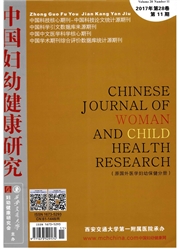

 中文摘要:
中文摘要:
多囊卵巢综合征是育龄期女性最常见的生殖内分泌紊乱疾病,现已成为导致女性代谢综合征的一个潜在原因。多囊卵巢综合征个体存在代谢危险因素,其已引起医学界对多囊卵巢综合征与代谢综合征之间存在相关危险因素的重视,并对多囊卵巢综合征可能出现的并发症进行广泛地研究。多囊卵巢综合征临床症状常伴有肥胖,而胰岛素抵抗和高胰岛素血症已成为多囊卵巢综合征和代谢综合征病理生理及临床表现改变的关键环节。高雄激素血症作为多囊卵巢综合征的主要内分泌特征,已经成为多囊卵巢综合征和代谢综合征之间相互作用的一个重要危险因素。该文就多囊卵巢综合征与代谢综合征之间存在的主要危险因素进行综述。
 英文摘要:
英文摘要:
Polycystic ovarian syndrome (PCOS) is the commonest endocrine disorder of women of childbearing age and becomes a potential cause of metabolic syndrome (MBS) of women. Available data suggest that MBS individuals have metabolic risk factors, which has attracted more concern of medical workers on relationship between PCOS and MBS and many researches on complications of the women with PCOS are conducted. Obesity is a common sign of women with PCOS, while insulin resistance (IR) and hyperinsulinemia (HI) are critical links in pathophysiology and clinical presentations of PCOS and MBS. Hyperandrogenemia, as a predominant endocrine characteristics of PCOS, is an important risk factor in interactions between PCOS and MBS. This article reviewed main risk factors existing between PCOS and metabolic syndrome.
 同期刊论文项目
同期刊论文项目
 同项目期刊论文
同项目期刊论文
 期刊信息
期刊信息
